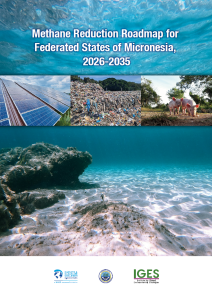The Federated States of Micronesia (FSM) has launched its first Methane Reduction Roadmap, reinforcing its leadership as a Global Methane Pledge Champion. Methane is a potent short-lived climate pollutant, more than 80 times more powerful than carbon dioxide over a 20-year period. Reducing methane emissions offers rapid climate benefits, improved public health, and economic opportunities.
FSM’s methane emissions in 2018 were estimated at 1.72 Gg, with 54 percent coming from waste sources such as solid waste disposal and wastewater, and 46 percent from agriculture, primarily manure management. By 2035, FSM aims to reduce methane emissions by 12.4 percent nationally compared to 2020 levels. State-specific targets include a 15.6 percent reduction in Pohnpei, 10.9 percent in Chuuk, 8.0 percent in Yap, and 10.2 percent in Kosrae.
To achieve these targets, the roadmap prioritizes actions such as improving landfill management and constructing a new landfill in Chuuk, diverting organic waste through composting and mulching, reducing waste generation via circular economy practices, and promoting decentralized wastewater treatment systems and anaerobic digesters for biogas production.
The roadmap delivers multiple co-benefits, including better public health, cleaner water, renewable energy, and job creation. Successful implementation will depend on enablers such as technical capacity, public awareness, financing, gender inclusion, and strong regulatory frameworks. A robust Monitoring, Reporting, and Verification (MRV) system, led by the Department of Environment, Climate Change, and Emergency Management (DECEM), will ensure transparency and support access to climate finance.
This roadmap demonstrates FSM’s commitment to climate resilience and sustainable development, aligning with its Updated Nationally Determined Contribution (NDC) and regional leadership in tackling short-lived climate pollutants.

